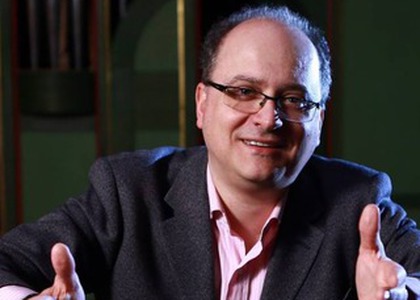> [Archived] Interviews

RRM 25 –Interview with composer Dan Dediu
Mister Dan Dediu, it is well know that you are not only one of the most appreciated Romanian composers and musical teachers, but that you also have made solid contributions to the field of musicology and you have shown to generally have an extraordinary appetite for all facets of the musical phenomenon. I'm convinced that no aspect of it escapes you. Furthermore, you have strong ties with Radio România Muzical, which broadcasts your music and where you appear as a regular guest and more. From the perspective of your own audience, what does the single classical musical station in Romania mean? What sort of relationship do you have with Radio România Muzical?
First of all, thank you for the introduction and I must say that I always listen to Radio România Muzical. Actually, thanks to this radio station, I was inspired to write the opera "A Lost Letter". I was lost in traffic, listening to Radio România Muzical and suddenly, whenI hear Piazzolla and Gardel's tangos, an idea that I've been searching for about a year popped into my mind. Prior to that, I wasn't able to find an idea that could merge that opera's entire libretto.There, this would be an example. If it weren't for Radio Romaânia Muzical, maybe I wouldn't have come up with this idea and "A lost Letter" wouldn't have come to life. But, aside from this personal fact, I must say that there is an ecological dimension at play here, regarding the turmoil in which we live in, on radio stations, without even mentioning online, that's sapping our lives, starting with the pandemic from two years ago. It's an escape, in my opinion.It's very neat that such a radio station exists. There is a lot you can learn from it, not just by listening music, but also through the quality commentary that the editors of this music station produce.
In your opinion, is there something that is more or less difficult to describe, which individualizes the offer of a radio station dedicated to classical music,representing an edge during the current context, where via the internet, music is more broadly available? And if so, what does Radio Romania Musical uniquely have from this point of view?
That's a good question and can be answered in many ways. As I've said, I think the structure of the programs is interesting. The fact that you have the opportunity to listen to Romanian music, again I feel is an important edge, symphonic Romanian music as well as chamber, choral and vocal music. It's something that can't be found anywhere else. It's great that we are broadcasting this treasure that we have recorded. The live concert broadcasts and recordings also amount to a musical treasure. I could say that the program's structure enables personal development, regarding self-musical education. When you listen to a Radio România Muzical program,you have access to collateral and quality information and I can point out the 25 years of beneficial development of the journalistic discussion of music, which holds in-depth information and is also expressed in a pleasant way by the editing team. Last but not least, I can say that meeting with serendipity is an interesting trait, in the sense that I simply turn on the radio, I catch the middle of a song that fascinates me and I keep on listening. This aspect is very important especially since we are not talking about any type of classical, romantic, baroque, contemporary music or interesting, contrasting performances, that either show up for the first time or are from the radiophonic vault. I think these things make the difference and there's one more thing, currently, just about all radio stations play music where the percussion, drums, or groove layer as they say can be heard constantly. Well, the fact that there exists a radio station that plays music without groove is an important distinction.
In 2018 you created the "A subjective history of Romanian music" series. How has your work fared and what feedback have you received?
This offer from Radio România Muzical caught on and I got my hands on many books to realize a hour-long show.I spent a lot of time picking examples, choosing words, choosing ideas to express, to set aside, knowing that whatever you set aside adds meaning to what you have to say. So, in the end it was a fascinating experience from which I also have learned a lot.
If you were to make a Top 3 collaborations with Radio România Muzical so far, what would that look like.
I couldn't really pick. I can say that whether they were brief or long, whether I was the head or was interviewed, I enjoyed all collaborations that I've had with Radio România Muzical. I also love that this station has grown little by little in visibility and quality. One more important thing, as I've said, Radio Romania Musical has a well-made site with relevantnews and interviews. I could say it'simpeccable and can be compared to many sites from foreign radio stations.
We exist in a volatile, unpredictable and competitive media landscape, so I would say that 25 years truly reflects an age of maturity. What do you see in the station's future and what would you wish for it?
I wish for the station and the people running Radio România Muzical to hold the same adaptability that they have shown to have so far, the same openness towards the world of music, the same desire to bring the audience the latest information as well as the desire to preserve the tradition of Romanian music. To continue with new recordings and new faces so that we have a plethora of young and unique composers and performers. I believe they also must be known and recognised in the future.
Translated by Jin-Cristian Yang,
University of Bucharest, Faculty of Foreign Languages and Literatures, MTTLC, year II
Corrected by Silvia Petrescu














